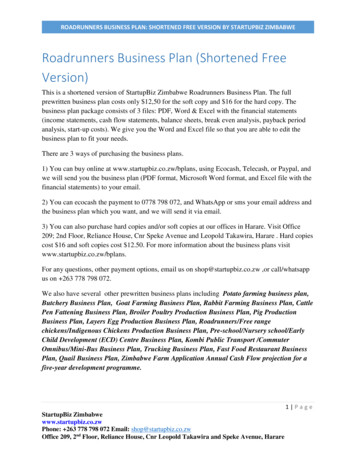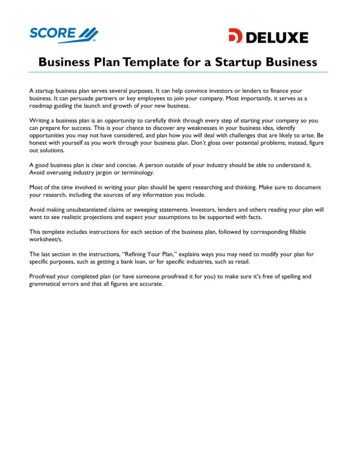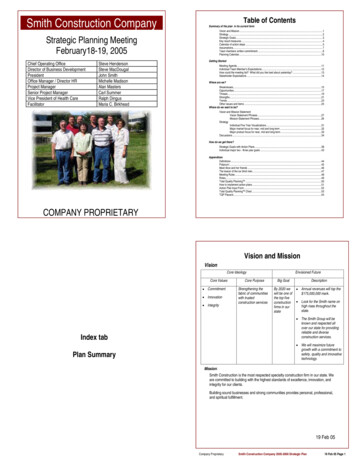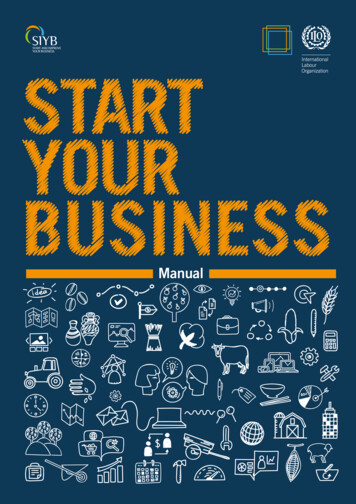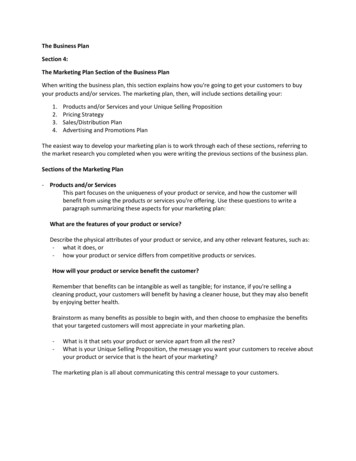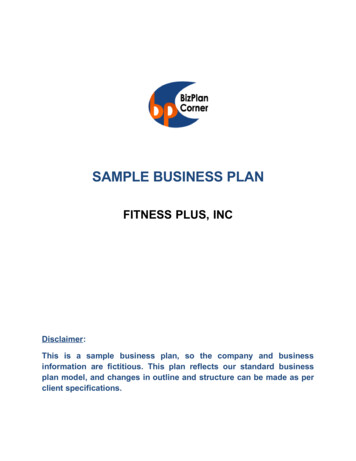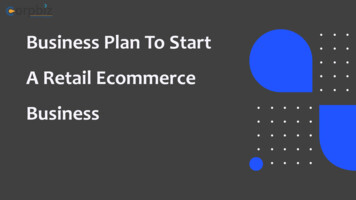
Transcription
Business Plan To StartA Retail EcommerceBusiness
erviewMarket StudyProductStrategyIndustryMode ofOperationsRisk ManagementFinancial Forecast
The Ecommerce IndustryThe Indian economy has witnessed tremendous growth in the pastdecade owing to an unprecedented rise in number of consumers forgoods and services in the country.The retail ecommerce industry has grown more than 4 times in thelast ten years.Be it individuals, households, or businesses, ecommerce has broughtthe world closer and more accessible for hassle-free purchase ofproducts on-the-go.
Factors That Led To Growth ofEcommerce In India Technological Disruption- more people have digital devices Digital India and Cashless India Initiatives by the Government Telecom boom in the country- more 3G, 4G and Broadbandconnectivity Increase in Net Earnings and Disposable Income of theIndividuals
SWOT Analysis of EcommerceIndustryEvery business has its own threats and weaknesses and any newplayer that wishes to enter the ecommerce sector must understandthem, as well as the opportunities and strengths of the sectorbefore diving into the competitive market.For this, a SWOT Analysis must be performed for the industry.
StrengthsWeaknesses Lower Maintenance Costs 24*7 Store Accessibility Elimination of Middle-men Hit or miss digital marketing Highly competitive businesssector Stringent regulatory changesand norms.OpportunitiesThreats Connectivity to a largecustomer base Barriers to location areremoved Multiple channels ofMarketing Technology failures, datahacksandsecuritybreaches. Chances of customer fraudsand refund scams
Market TrendsLeading Sectors In Indian EcommerceIndustry In 20198%3% 3%9%48%29%ElectronicsApparelsHome and FurnishingBeauty and Personal CareBooksMiscellaneous
Competitor AnalysisA new ecommerce player is required to conduct an in-depth analysis of itscustomers to understand: The existing market trends How customers react to different competitors Marketing strategies of competitorsand build its own: The operational and marketing strategies. Market segmentation strategy. Risk management and planning policies. Technology frameworks, etc.
Example of Competitors in Online Grocery StoreSector in IndiaAmazon FreshGrofers A growing player in theonline grocery sector Nationwide reach Same-day deliveries Enjoys 18% ofmarket share Nationwide reachwith limitations.Big BasketGodrejNature’sBasket The leading player in thesector Nationwide reach Delivery slots system Holds 13% of the marketshare Nationwide reach withlimitations. Delivery slots
Formalities Involved InStarting A RetailEcommerce StoreThe process to start an ecommerce retail store in India is multistaged and requires thorough knowledge of the norms andregulations applicable.
BusinessRegistrationTrademark RegistrationGST RegistrationShop and EstablishmentRegistrationWebsite DocumentsAdditional Contracts
BusinessRegistrationThis is the first step to start a business and give it a legalidentity. An ecommerce retail business must beregistered as: Private Limited Company Limited Liability Partnership One Person Company Sole Proprietorship Partnership Firm
AdditionalRegistrationsTrademark RegistrationTrademark registration protects the brand name, domain name, logo, slogan,etc. used by the ecommerce business and prevents anyone from using itwithout permission or license.Tax RegistrationTax registration for GST return filing is mandatory for all ecommercebusinesses in India.Shop and Establishment RegistrationAn ecommerce business is also required to obtain the State regulatedShop and Establishment registration certificate to run a backendoffice.
WebsiteDocumentsTerms of UseMission is the reason why your company exists. It is the visible and tangibleeffect you want your company to create for your customers and the world.Privacy PolicyThe Privacy policy lays down the manner in which user or visitor informationwould be manage by the company.DisclaimerA disclaimer frees the business from any liability arising out of contentposted by any user or third party.Refund, Return and Cancellation PolicyThis policy lays down the conditions relating to order refunds, productreturns and order cancellation by customers.
AdditionalContractsVendor AgreementsVendor agreements between the ecommerce company and its productvendors lay down the conditions relating to supply of goods, prices, qualitystandards, etc.Service Level AgreementsService level agreements define the terms and conditions relating to anybusiness services availed by the ecommerce retail store, such as logistics,internet services, etc.Employment and HR DocumentsEmployment agreement lays down the terms of employment for the business’semployees and staff; HR Documents include HR policies and proceduresrelating to code of conduct, promotions, complaints, appraisals, etc.
Market StudyIt is essential to evaluate the actual market size and customerdemographics before starting a digital store.A market study also allows the business to take smart marketingdecisions that target the right customers that would be interested inbuying its products.
Market DemographicsMarket Size250 Million people haveinternet connections28 Million people are onlineshoppers900 Million people havemobile phones.63% internet users are 20-49years of age12% Population has smartphones2 Billion digital customersworldwide
ProductStrategyThis defines the kinds of products the ecommerce retailbusiness would be engaged in.IMPORTANCE: Allows the business to define its targetaudience and set its marketing and operational strategies.Example of an ecommerce Grocery Store: Dairy and Bakery items such as milk, yogurt, cheese, tofu, breads, biscuits,etc. Ready-to-eat products such as canned foods, instant noodles, etc. Daily personal care essentials such as skin care products, hair careproducts, oral care products, hygiene products, grooming products, etc. Household essentials such as cleaning products, cooking oils, lentils,grains, dry fruits and nuts, etc. Snack products such as chips, namkeens, cookies, chocolates and candies,etc.
Mode Of OperationsA retail ecommerce business would always operate as a digital hybridmodel whereby the customers are able to purchase the business’sproducts through a web-based platform as well as a user-friendlymobile application.The business needs a well-defined strategy of how the differentactivities are conducted such as user connectivity, channels ofoperation, marketing, technology to be used, HR Structure, etc.
Marketing StrategyA marketing strategy helps a business in defining the bestpossible ways to utilise its available resources and reach thetarget audience effectively.An ecommerce business must recognise the different channelsof marketing to decide which marketing plan would be the bestto connect with its potential customer base.
MarketingStrategyExampleDigital ChannelsPaidAdvertisementsConsumerForumsSearch EngineOptimisationSocial MediaMarketingPhysicalChannelsNewspaper AdsBillboardsPamphletsGoogle Play Ads
OperationalSystemPurchasing ProcessThe ecommerce business must have a well-defined process of how theconsumer’s purchasing journey would begin from visiting the digital storeto making the payment for the products.DeliveryThe digital store must also have a defined strategy regarding itslogistics, whether it will be in-house or outsourced, and the deliverymethods it would adopt to ensure prompt customer service.ReturnsIn case the customer wants to return their order, the company must have adefined process and eligibility standards, which can be displayed on thewebsite in the form of its Return, Refunds and Cancellation Policy.
DeliverySystem Example2-Hour DeliveryThe user is able to get the purchased products delivered within 2 hours upon paying a nominaldelivery fee.8-Hour DeliveryThe user gets an option to get the product delivered within 8 hours when the order is placedearly in the morning.1-Day DeliveryThe user is able to opt for a 1-day delivery when the order is placed any time during the day. Theorder gets delivered the next day during the time slot chosen by the user.Simple DeliveryThe delivery would not be time-bound and would be applicable for orders in remotelocations, where logistics would require more than a day to deliver.
HR StructureA retail ecommerce business is required to have an experienced andskilled Human Resource team that can efficiently handle its digitaloperations as well as on-field activities.The business must hire subject matter and industry experts fromdifferent fields as team heads for core departments such as productmanagement, technology, sales, marketing, logistics, finance, etc.,and establish its internal HR department to recruit experiencedindividuals who possess subject matter knowledge.
ExampleBOARD OFDIRECTORSTEAM LEADERSASSOCIATESSUPPORT STAFFAND DELIVERYEXECUTIVES
Technology OverviewThe key feature of an ecommerce business is undoubtedly its digitalplatform. The platforms should be able to handle bulk traffic and becompatible with web browsers such as Mozilla, Firefox, IE5 , Netscape,etc., and mobile operating systems such as iOS and Android. Theecommerce business’s website should have complete data backup on anexternal server as well for full-backup
I .UI/UX Designing involves creating a user-friendlyand attractive ecommerce platform that allows aseamless buying experience.II. Website Slack involves frontend andbackend development tools such as:UI/UX Programming languages such as JavaScript,PHP or Python for the backend, and HTML, JavaScript, and CSS for the yIII. Mobile Application tools includesprogramming languages, and suites fordeveloping mobile apps such as:For iOS App, programming languages likeObjective-C, Swift; toolkit like Apple Xcode; iOSSDK for application programming interface.For Android App, programming languages suchas Java, Kotlin; Android Studio & AndroidDeveloper Tools as toolkits; Android SDK for APIintegration.IV. Payment Gateway to receive payment foronline purchases, such as gateway with ability toreceive payments through Cash on Delivery,NEFTs, UPI, debit and credit card payments,PayTM, etc.
Risk ManagementPoliciesManagement and mitigation of risks is critical for an ecommerce businesssince it is suseptible to an array of risk factors. Laying down an internal orexternal policy or strategy is essential to counter any such situations.
ExampleType of RiskRiskManagementPlanTechnologyDataEncryptionand BackupsAccountFraudFraudDetection gePolicies
Financial ForecastingWith the growth rate of ecommerce sector in India predicted tomultiply in the coming years, new ecommerce players haveoutstanding opportunities to enter the ecommerce market andharness latest technologies and employ customer-centric services,and establish a successful and viable ecommerce business in thecountry.
Retail Ecommerce RevenueForecast in India In USD Billion49.466.256.762.32021202220232024
Corpbiz is a technology-driven online platform that provides legal andadvisory services to businesses, be it small startups or large corporatehouses. Corpbiz is a renowned platform in India for all kinds of businessrelated services including new business registration, governmentregistrations, tax registrations, Trademark, Compliance filings andmanagement, to name a few.Corpbiz is supported by a team of Chartered Accountants, CompanySecretaries and Lawyers, who hold subject matter expertise in an array ofbusiness related services and can act as your guide and partners for yourrequirements relating to: Business Registration as a company, LLP, OPC, etc. Government Registrations such as Trade License, PSARA License, S&ERegistration, IEC Registration, and much more. Trademark Registration under the right Trademark classes. Tax Registration such as GST Registration, Professional Tax/TDS/IncomeTax filing. Annual ROC Compliance Return Filings.About Corpbiz
The End
Government Registrations such as Trade License, PSARA License, S&E Registration, IEC Registration, and much more. Trademark Registration under the right Trademark classes. Tax Registration such as GST Registration, Professional Tax/TDS
